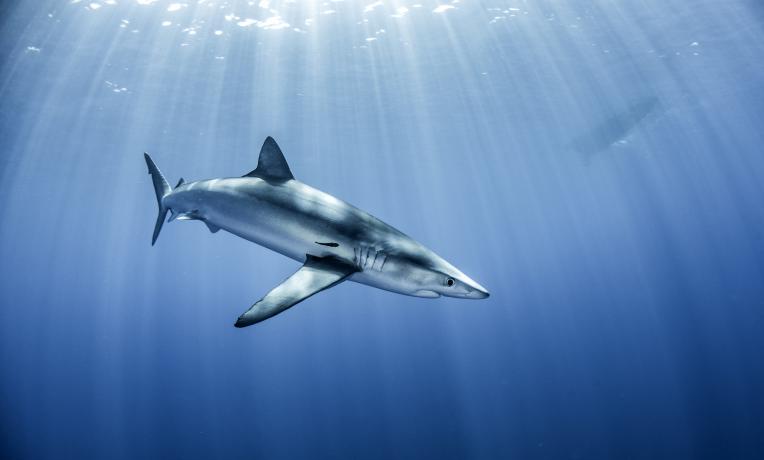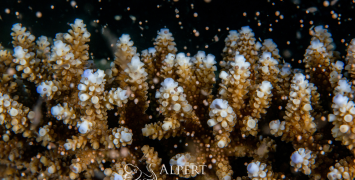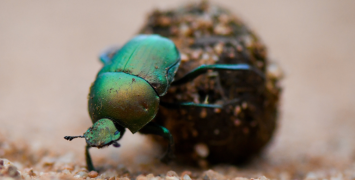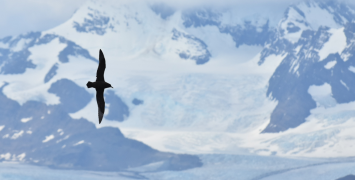Revealing the secret life of sharks in a warming ocean
Although it is widely known that global warming has a direct impact on our ecosystems, there is little information about its effects on oceans’ top predators, such as pelagic sharks and tunas. How does ocean deoxygenation brought about by climate change influence their habitat? And how do they adapt their behaviour to this changing environment? David Sims and his team at the Marine Biological Association Laboratory in the United Kingdom aim to reveal how climate change, oceans’ predators and fishing fleets interact.

Throughout Earth's history, the level of oxygen in the oceans has always fluctuated, but over the last 50 years there has been a reduction of about two percent. Some of these losses are particularly acute in oxygen minimum zones, places in the world’s ocean where oxygen saturation in the water column is at its lowest.
Scientists predict that climate change will further lower oxygen levels in the oceans, particularly in the oxygen minimum zones. This is likely to have a significant effect on the ecology and behaviour of a range of ocean species: both predators and prey.
ERC grantee David Sims is exploring the effects of ocean deoxygenation on the behaviour and ecology of top predators. Interestingly, his preliminary work shows that predators tend to move into areas with oxygen minimum zones at depth, and some appear to stay there for a while. As part of his project, he will investigate what sharks are doing in these low-oxygen (hypoxic) areas, and why they spend time there.
Watching this video you are accepting Youtube cookies policy
Tracking sharks’ journeys
Twenty-five years ago, Sims started studying sharks in UK waters as part of his PhD. He got into satellite tracking by trying to achieve a better understanding of the basking shark’s feeding habits.
Not long after, Sims and his team realised that not much literature was available on the topic of sharks in relation to their oceanic environment, so they founded the Global Shark Movement Project and started tracking sharks in the central Atlantic.
They noticed that blue sharks moved from around the Azores Islands to West Africa, encountering an oxygen minimum zone there. This prompted them to start tracking fishing vessels too, looking for a potential link between the two. Soon after, they discovered that oxygen minimum zones were areas of high catch of sharks and other fish, prompting them to investigate further the relationship between fisheries, predators and low oxygen levels.
Fish in a barrel
The fact that oxygen minimum zones are fishing hot spots is relatively easy to explain. In order to survive in these low-oxygen environments, sharks, tunas and other fish must stay relatively close to the surface most of the time, where oxygen levels are higher. Being compressed in a smaller volume makes them more vulnerable.
‘Essentially, it's the shooting fish in a barrel analogy,’ says Sims. ‘If you've got less water in a barrel it's easier to catch the fish.’
What remains a mystery, however, is why sharks spend so much time in these zones, where they are ending up on hooks of long-line fishers in higher numbers. Throughout this project, Sims is hoping to find the answer.
Diving after squid and octopus
Interestingly, scientists know that not all shark species spend all their time near the surface of these zones, but can also dive deep into the areas of lower oxygen and stay there for some time. These are cold-bodied shark species such as blue sharks, which have a lower metabolic rate than warm-bodied sharks like shortfin makos, and therefore likely withstand hypoxia for short periods of time.
As to what these sharks are doing in these dead zones, David Sims’ team hypothesizes that they are actively hunting hypoxia-tolerant cephalopods, such as deep-water squids and octopuses, as it represents a biomass of food that is less exploited.
As part of their project, they will investigate to what extent different shark species hunt in the top layer where hypoxia-intolerant prey species are also compressed, and to what extent some of them may move into oxygen minimum zones to feed on hypoxia-tolerant prey, thus avoiding the surface-layer competition with other predators.
Data collection
To test this and other hypotheses and get insights into the sharks’ behaviour, Sims and his team need to collect lots of data. Usually, researchers track sharks with one of two methods. The first one uses a satellite transmitter attached to the fin of the shark: whenever the animal comes to the surface, the device relays data via messages to polar orbiting satellites. The second one uses a more sophisticated tag that sharks tow along. At a pre-programmed time, the tag is released and floats to the surface to relay data.
However, in this ERC project, Sims and his collaborators are even going a step further. They are developing new tags with oxygen sensors, which will allow them to get oxygen data directly from the sharks’ environment. The new tags are also equipped with accelerometers that sample sharks’ body movements as they twist and turn. One of them will also have a very small, integrated video camera that will enable Sims and his team to see what the sharks are seeing.
‘Essentially our sharks and tunas will act like animal oceanographers’, says Sims. ‘They'll be out there measuring oxygen at different depths. In addition to testing our hypothesis, we hope that this data will also be valuable to oceanographers to help them understand how climate change is influencing these oxygen minimum zones.’
The future of the ocean
If oxygen minimum zones are indeed expanding due to climate change, as some models predict, this could make fish – both predators and prey – more vulnerable to fishing.
However, Sims remains optimistic about the future of oceans. ‘As someone who tracks wild animals in the open ocean with very expensive tags, and no promise of conclusive results, you need to always remain optimistic’, he says.
In the last decade, an important amount of research has been done on the topic, and more scientists and policymakers have grasped its importance, he adds. Additionally, researchers around the world like himself are now able to generate data on oceans, fish and fisheries, and to come up with solutions.
‘With the knowledge that our project and others will gather, we will be in a better position to propose solutions for the management and conservation of these high seas environments’, he says. ‘This constitutes a power base from which we can hopefully spring forward.’
The benefits of winning an ERC grant
Sims notes that receiving an ERC grant gave a great amount of visibility to his research and attracted the interest of scientists from other disciplines. It will also enable him to support a team of 20 scientists, and to get up to 150 researchers worldwide involved in the project.
As his project links several scientific disciplines, including ecology, physiology, animal behaviour, oceanography and engineering, this multidisciplinary aspect is also reflected in the composition of his team.
‘Throughout my career I have worked with scientists from various backgrounds and it has been some of the most productive research’, says Sims. ‘The ERC wants to promote research at the edges between different fields, and this is exactly what our project aims to do.’
BIO
Professor David Sims is a British marine biologist. He gained a PhD in animal behaviour and was lecturer in the Zoology Department at the University of Aberdeen before becoming a Research Fellow at the Marine Biological Association (MBA) Laboratory in Plymouth in 2000. He is an MBA Senior Research Fellow and a Professor of Marine Ecology in the National Oceanography Centre Southampton, at the University of Southampton. During his career he has won several awards for his work in animal ecology and is the founder of the Global Shark Movement Project.






